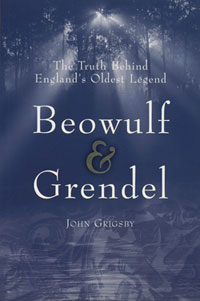 Beowulf & Grendel: The Truth Behind England’s Oldest Legend by John Grigsby
Beowulf & Grendel: The Truth Behind England’s Oldest Legend by John Grigsby
Reviewed by Antonius Block
The poem known to us today as Beowulf has been something of an enigma since it first began to receive serious scholarly attention almost two hundred years ago. That it survived into the modern era at all is nothing short of miraculous, but many of the allusions contained within the text would seem to suggest that it is the sole surviving component of a much larger tradition. Though there are a few widely accepted conventions, there are still no concrete answers to some very basic questions about the poem’s origins. When was the poem originally composed? Where was it composed? Who commissioned its composition and for what purpose? In an era when book making was an enormous investment, words were not often committed to vellum idly. Though many of the characters appearing in the epic are mentioned elsewhere in the context of early Scandinavian and Anglo-Saxon literature, Beowulf himself is not. Epic poems, especially those employing mythic themes, are usually meant to convey quite a bit more than the words of which they are composed would suggest. In this book, John Grigsby offers a new interpretation of the characters, events and symbolism contained in Beowulf. He has brought a wide array of factors concerning early northern culture together to make his point. His ability to connect sources from various disciplines and his obvious enthusiasm for these subjects make this one of the more interesting and fresh books to appear on the subject in a very long time.
In short, Grigsby hypothesizes that the poem metaphorically describes a shift in the religious practice of the Danes, and the ensuing suppression of an earlier agrarian cult centered on the recurring sacrifice of a dying god/sacral king at the instigation of his lover/mother. He argues that the English migrated to Britain before this change in cult practice took place and that English Heathenism fundamentally differs from all other Germanic variants. He argues that the Eddaic war between the Aesir and the Vanir, as well as many of the events described in the Saga of Hrolf Kraki (a work frequently demonstrated to contain parallels with Beowulf), describe this shift in theological dominance as well. I thoroughly enjoyed reading this book and found Grigsby’s style and pace attractive. His analysis of the poem’s metaphoric meaning is quite reminiscent of Robert Graves’ ritualist approach to the Greek Myths. In that respect I found the book to be a very compelling read. The book’s main strength lies in the large amount of information made available to the general reader that had previously only been published in works accessible to a very limited audience.
The reader should be very careful in approaching this book, however. Grigsby’s enthusiasm is matched by his academic recklessness. There are a lot of passages starting with “some have been led to believe…” or “some claim that…” which end with no citation. The logical question to this type of passage should always be, “Who believes that, and how do I know that ‘they’ are offering an opinion that can be trusted as informed or objective?” Furthermore, he makes it obvious on several occasions he is no linguist. This in itself is not condemning, but when employing linguistic evidence to support a claim, it doesn’t do an author any good to undermine his case by making a hash of the data. He cites Indo-European forms in his etymologies which don’t conform to any known transcription standard. On several occasions he seems to have trouble discerning Indo-European roots from Proto-Germanic forms (there is a big difference between the two). Other times, he seems to have pulled etymologies out of thin air.
I would also argue that Grigsby has grossly understated his debt to his sources. The works of P.V. Glob and Elizabeth Wayland Barber provided quite a bit more of the information contained in his description of early Northern Europe than his citations would suggest. His description of the cult of Ingui/Yngvi (which is a considerable portion of his argument) is so heavily reliant on Richard North’s work Heathen Gods in Old English Literature, I had recurring déjà vu while reading it. Entire chapters seemed as though they were periphrastic accounts of corresponding chapters in North’s work.
My biggest complaint, however, is his insistence that we accept the Heathenism of the Angles, with its emphasis on the pairing of Ingui and Mother Earth, as fundamentally different from other Germanic beliefs. He pushes this point repetitively but then includes comparisons with cults among those allegedly “different” Germanic peoples. Most notably, he uses the cult of Yngvi-Freyr in Sweden, to support his model of Anglian Heathenism.
“The Truth Behind England’s Oldest Legend?” I think “A Speculative But Kind of Informed and Interesting Hypothesis About The Truth Behind England’s Oldest Legend” may have been a better subtitle, but somehow I don’t think that would sell many books.
All that said, I still give it four out of five stars. The book is highly readable, enjoyable, and to a degree, insightful. I wish the author had followed through more thoroughly on many of his claims with more citation and less speculation. But the book isn’t an academic publication, and it is overall a very inspired work. While Grigsby is more indebted to his sources than he would admit, he has woven their material together quite well and brought a very wide array of scholarship and learning from an equally wide field of study to bear on a single poem. He owes no one but himself a pat on the back for that. If the author’s love of the subject were the only judgement criteria, I would give him ten stars. Beowulf & Grendel could be a seminal work that will redefine how the general reader, rather than just the scholar, views the Old North.









Leave a Reply